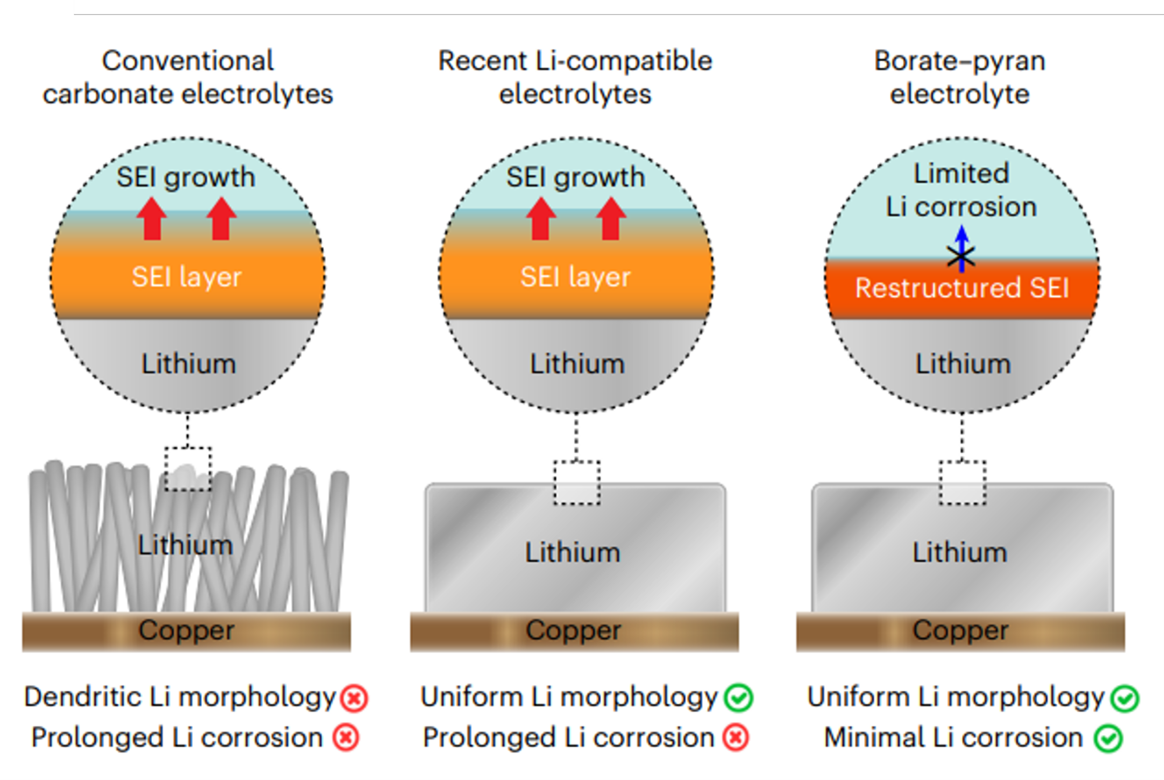- LG Energy Solution-KAIST successfully develops technology that dramatically enhances performance of lithium-metal batteries
- To address issues regarding conventional lithium-metal batteries, a borate-pyran-based liquid electrolyte has been applied for the first time in the world

(Source: Borate–pyran lean electrolyte-based Li-metal batteries with minimal Li corrosion
on Nature Energy, authored jointly by LG Energy Solution and KAIST)
As a leading battery innovator, LG Energy Solution is actively expanding its capabilities to achieve sustainable growth while remaining committed to building an ecosystem of global innovation for battery technologies. It now operates a diverse range of open innovation programs, builds networks with experts in various fields, discovers innovative ideas, and supports commercialization.
As part of these efforts, LG Energy Solution has successfully developed a source technology of lithium-metal battery that boosts the performance of the next-generation battery through a collaboration with Korea Advanced Institute of Science and Technology (KAIST), a national university and one of its most reliable partners. This research paper was published in the international scientific journal Nature Energy and has been recognized for its groundbreaking achievement.
Lithium-metal batteries, spotlighted as a next-generation battery, replace the conventional graphite-based anode material of lithium-ion batteries with a lithium metal to significantly improve energy density and driving range. However, conventional lithium-metal batteries have their issues, such as the formation of dendrite on the anode surface and continuous corrosion caused by the liquid electrolyte.
To resolve these challenges, LG Energy Solution and KAIST came together to introduce, for the first time, the effects and operational methods of the borate and pyran combination. This pioneering approach minimizes corrosion between the electrolyte and the lithium metal anode by reconstructing a solid-electrolyte interphase (SEI) formed on the surface of the lithium metal anode during charging/discharging into a dense structure.
This breakthrough unlocks a remarkable driving range of 900 km (560 miles) on a single charge, approximately 50% more than the average range of premium lithium-ion batteries. Additionally, it resulted in a stable lifespan with over 400 recharge cycles, while substantial improvements have also been made in charge/discharge efficiency and overall battery life.
“This study visualized the feasibility of lithium-metal batteries based on a liquid electrolyte that was deemed impossible until now,” said Kim Hee-tak, a professor of KAIST’s Department of Chemical and Biomolecular Engineering.
The remarkable outcome is the culmination of over two years of running the Frontier Research Laboratory (FRL) program between LG Energy Solution and KAIST, which was set up for the development of fundamental technology in next-generation lithium-metal batteries. FRL, a joint research center established in 2021 to develop source technologies, is operated by LG Energy Solution to collaborate with leading domestic and international universities and institutions on joint research and development (R&D) projects in the rapidly growing next-gen battery field.
| Europe | U.S. | Korea | |
|---|---|---|---|
| Institutions | University of Münster / Helmholtz International Labs | University of California San Diego | KAIST |
| Establishment | June 2022 | September 2021 | October 2021 |
| Challenges | Advanced LiB | All-solid-state battery | Lithium-metal battery |
In addition to KAIST, LG Energy Solution is running FRL programs with the University of Münster and Helmholtz International Labs in Germany with a focus on Advanced Lithium ion Batteries, as well as the University of California San Diego (UCSD) in the U.S. for the all-solid-state battery.
“By resolving conventional lithium-metal batteries’ biggest issue in collaboration with KAIST, LG Energy Solution is a step closer to its realization,” stated Geun-Chang Chung, Executive Vice President and Head of LG Energy Solution’s Future Technology Center. “We will continue to lead the commercialization of next-generation batteries through active collaborations inspired by our future-oriented FRL programs that leverage our differentiated technological capabilities.”
To solidify one’s technological leadership in the rapidly growing battery industry, global open innovation is more crucial than ever. LG Energy Solution is accelerating battery technology development by committing to more collaborations with academia, industry experts, and ambitious startups. LG Energy Solution aims to preemptively secure source technologies of next-generation batteries and maximize customer value by leveraging its powerful FRL programs which enlist the help of top experts from leading universities and institutions.